Medical Director Resume Examples

Jul 18, 2024
|
12 min read
Crafting your medical director resume: how to stand out in the health field.
Rated by 348 people
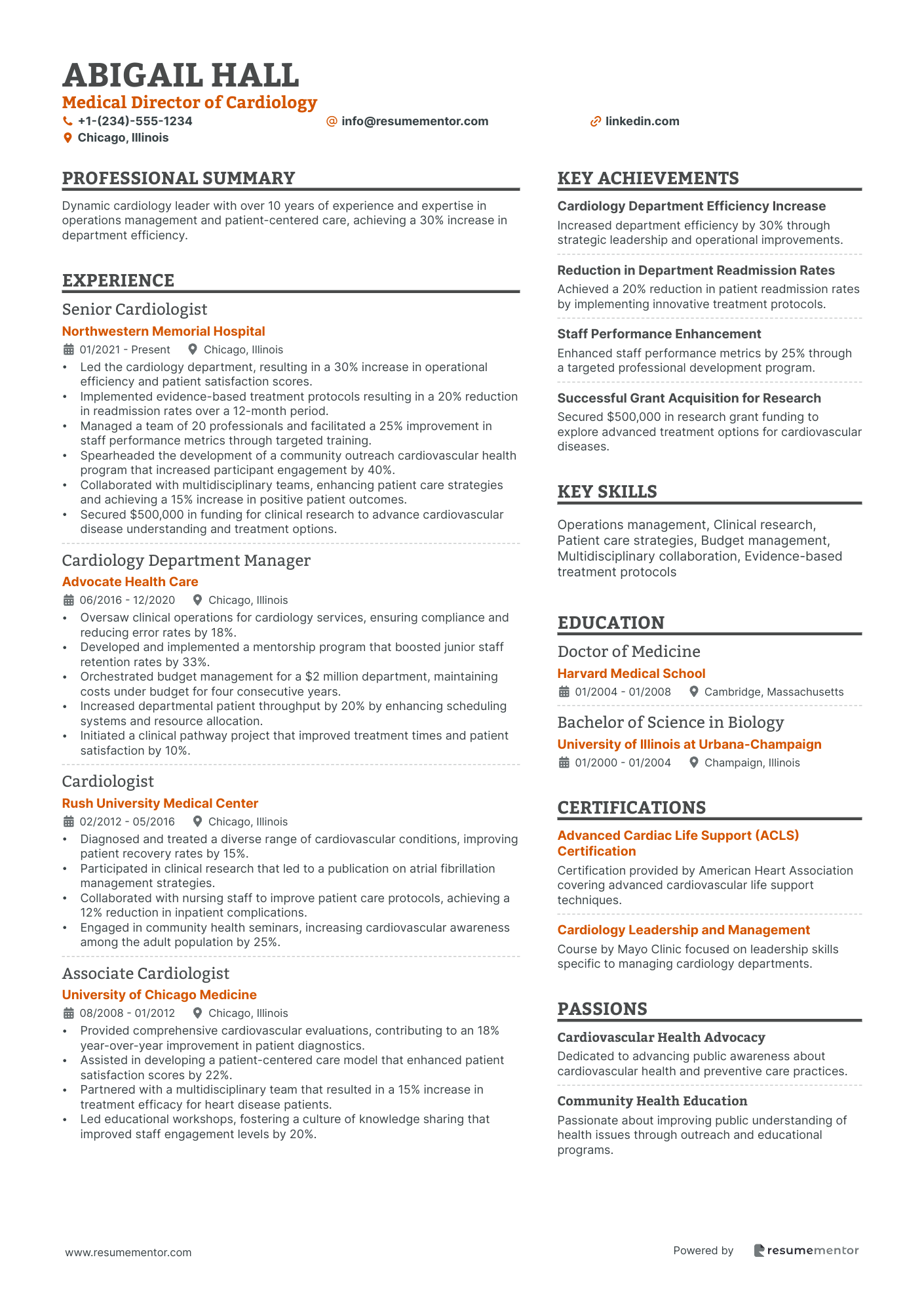
Medical Director of Cardiology
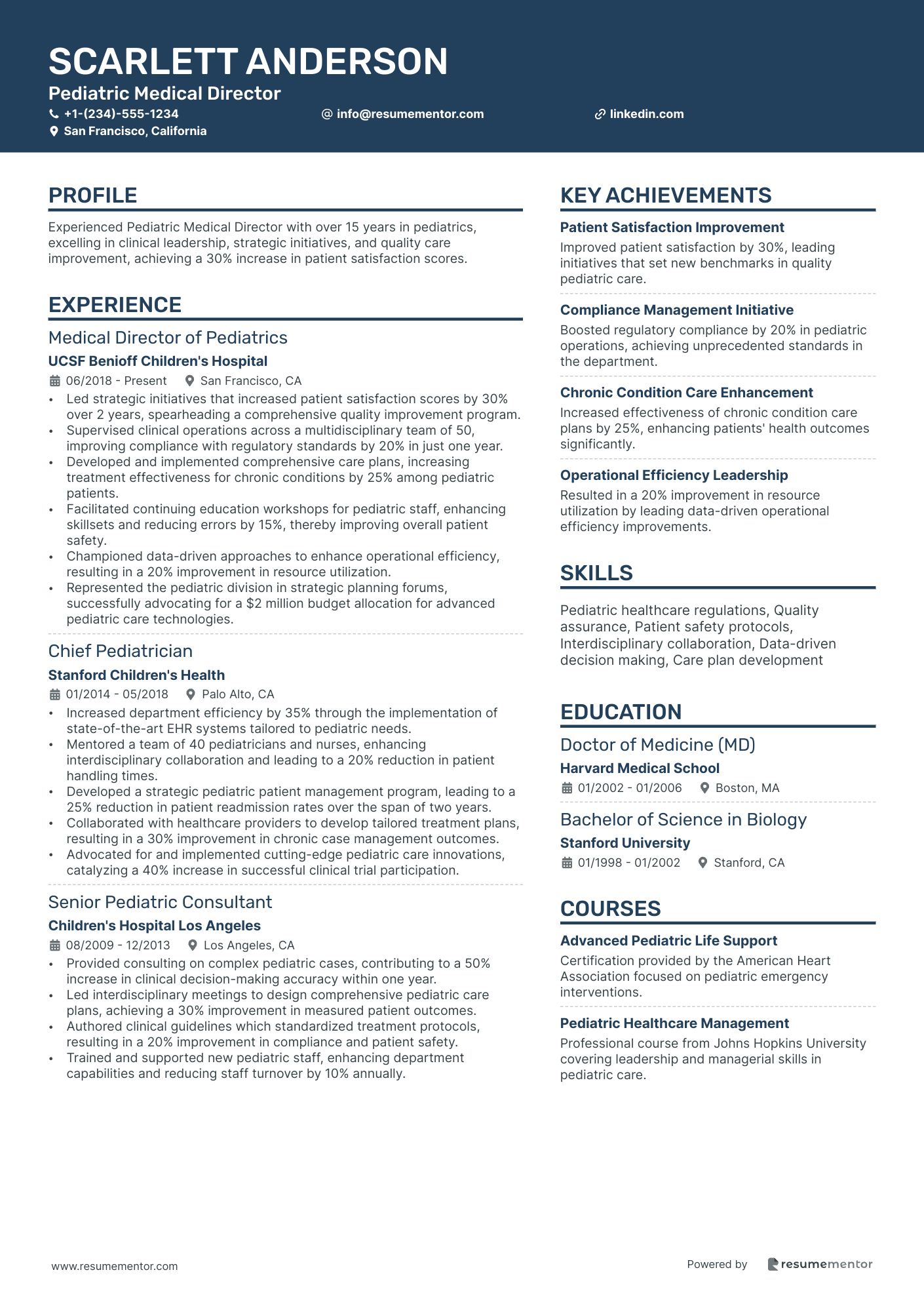
Pediatric Medical Director
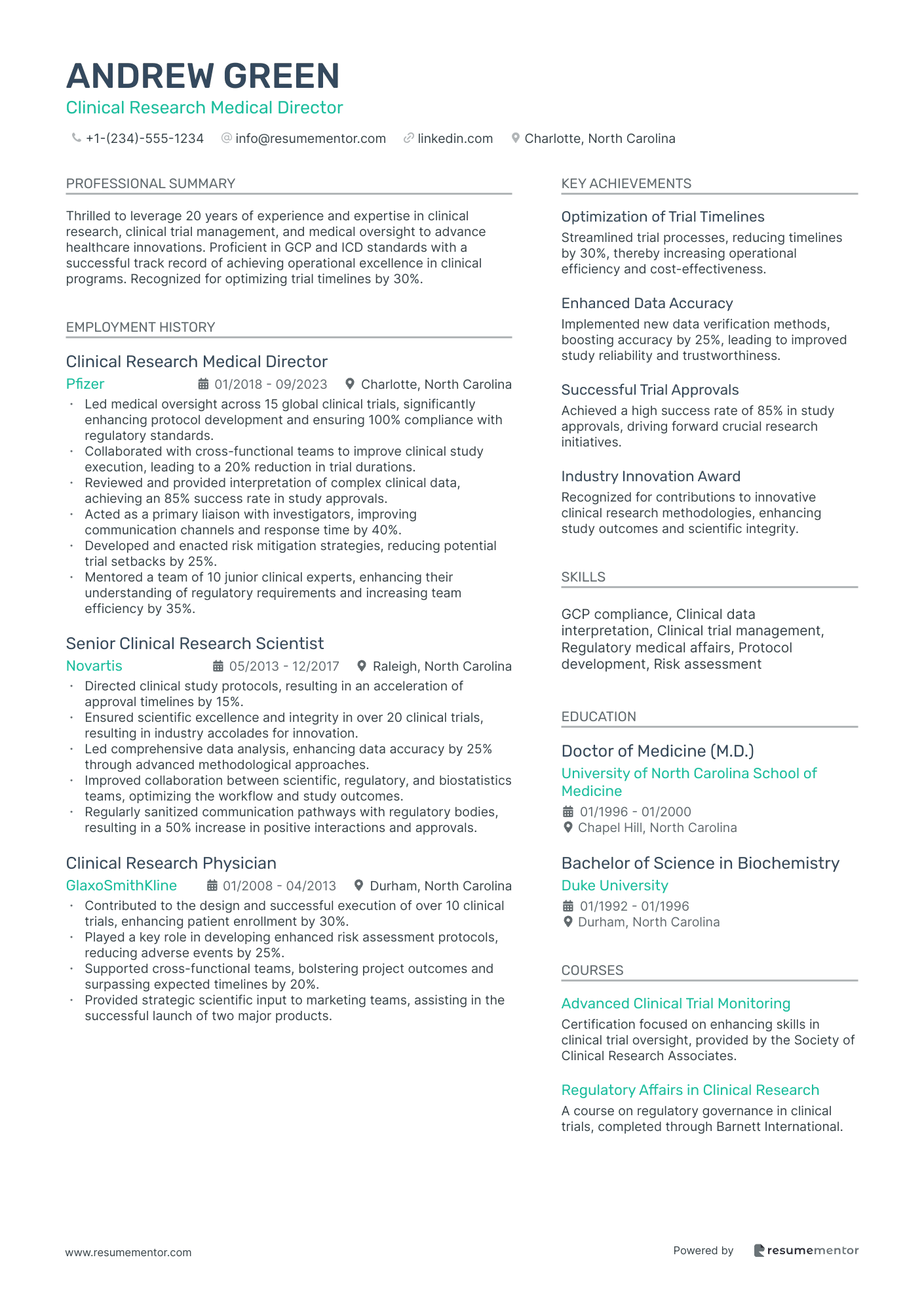
Clinical Research Medical Director
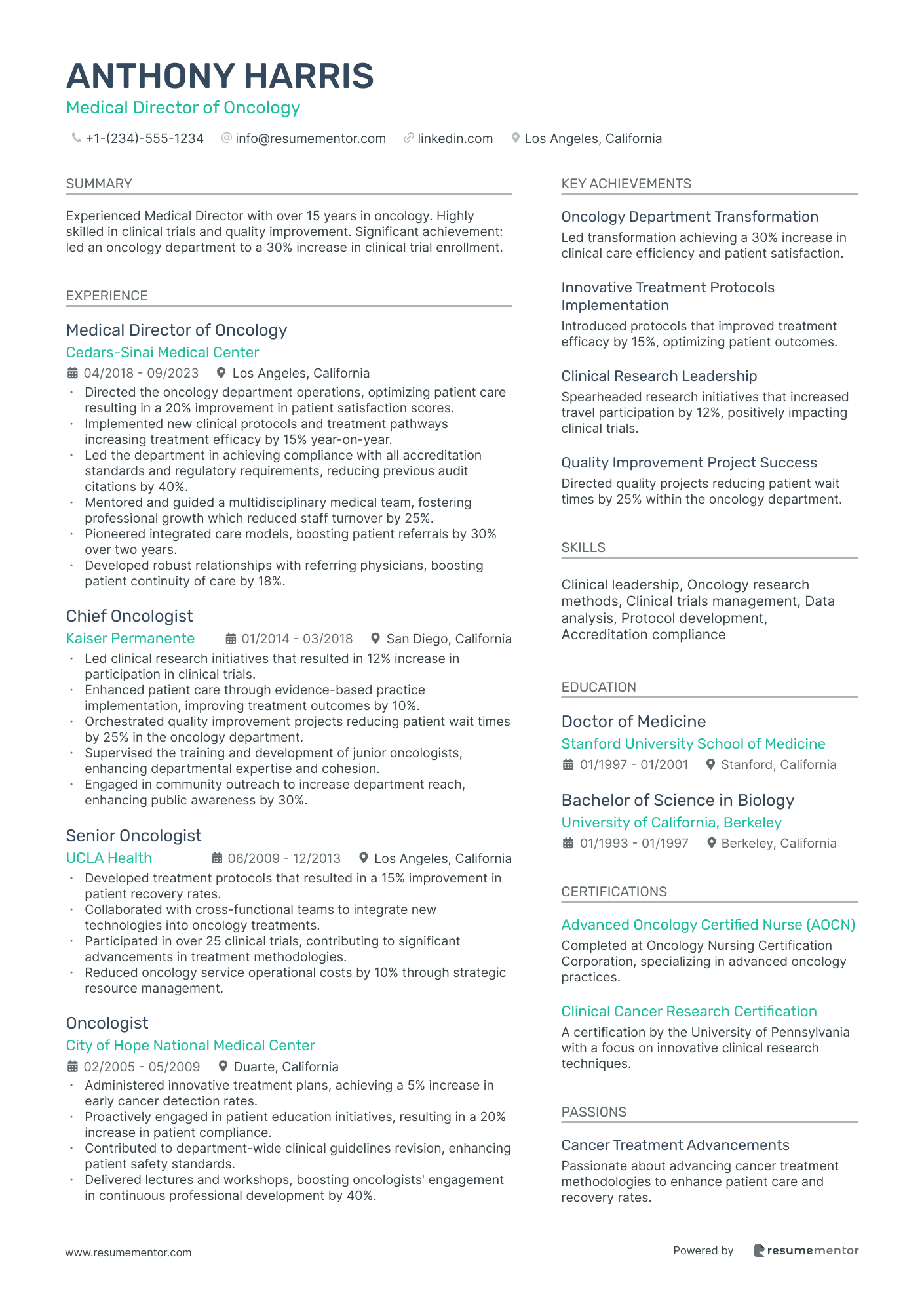
Medical Director of Oncology
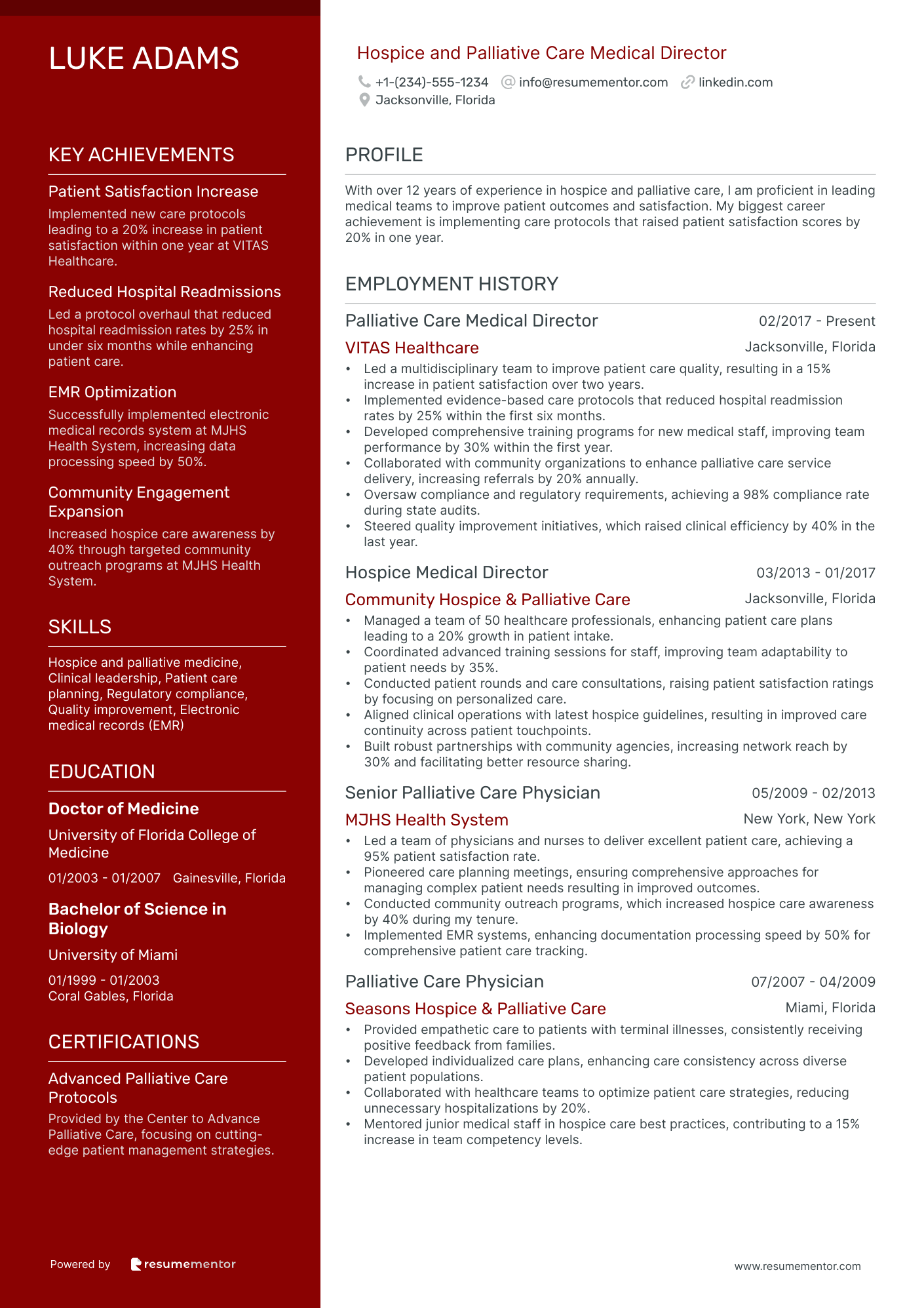
Hospice and Palliative Care Medical Director
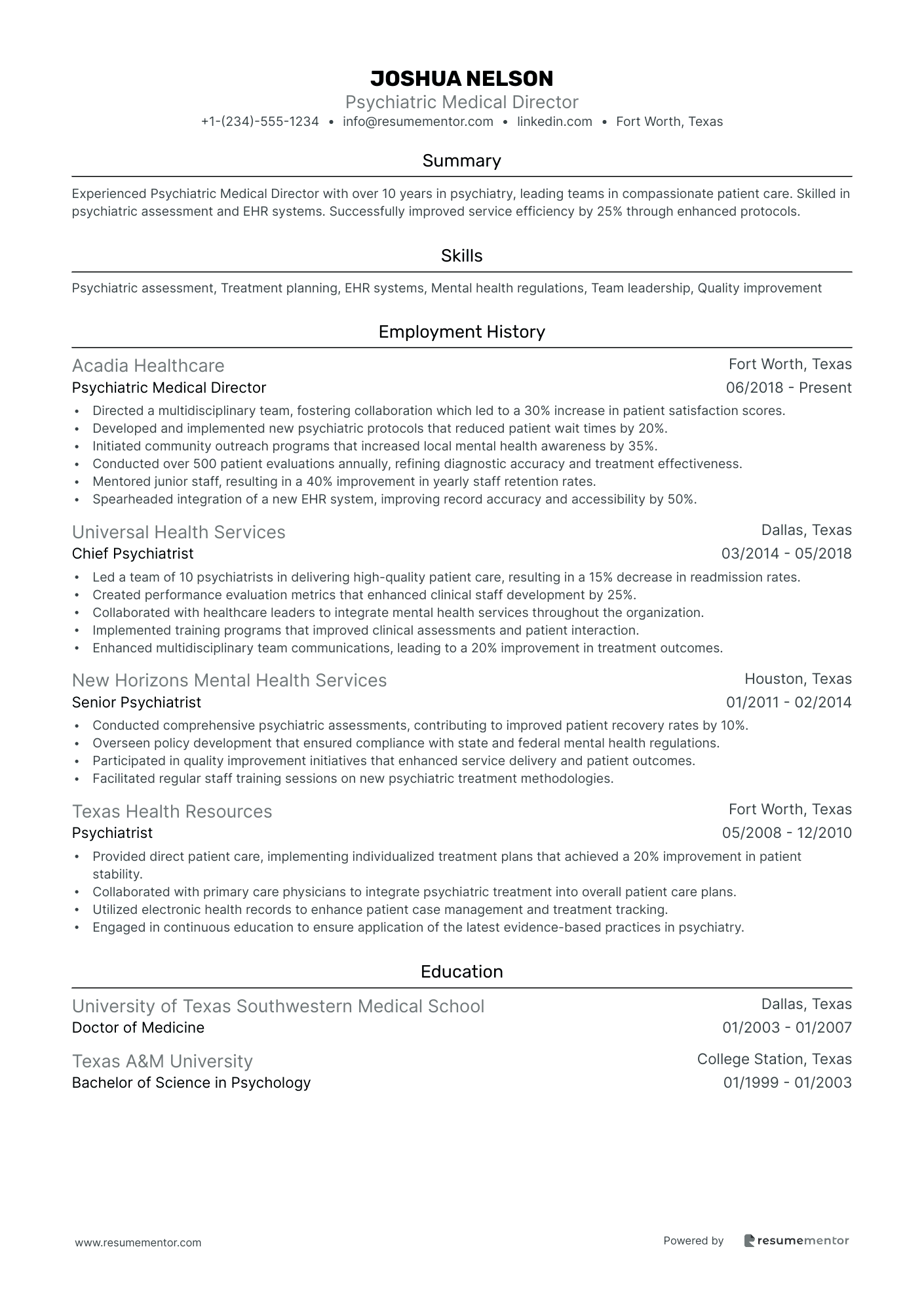
Psychiatric Medical Director
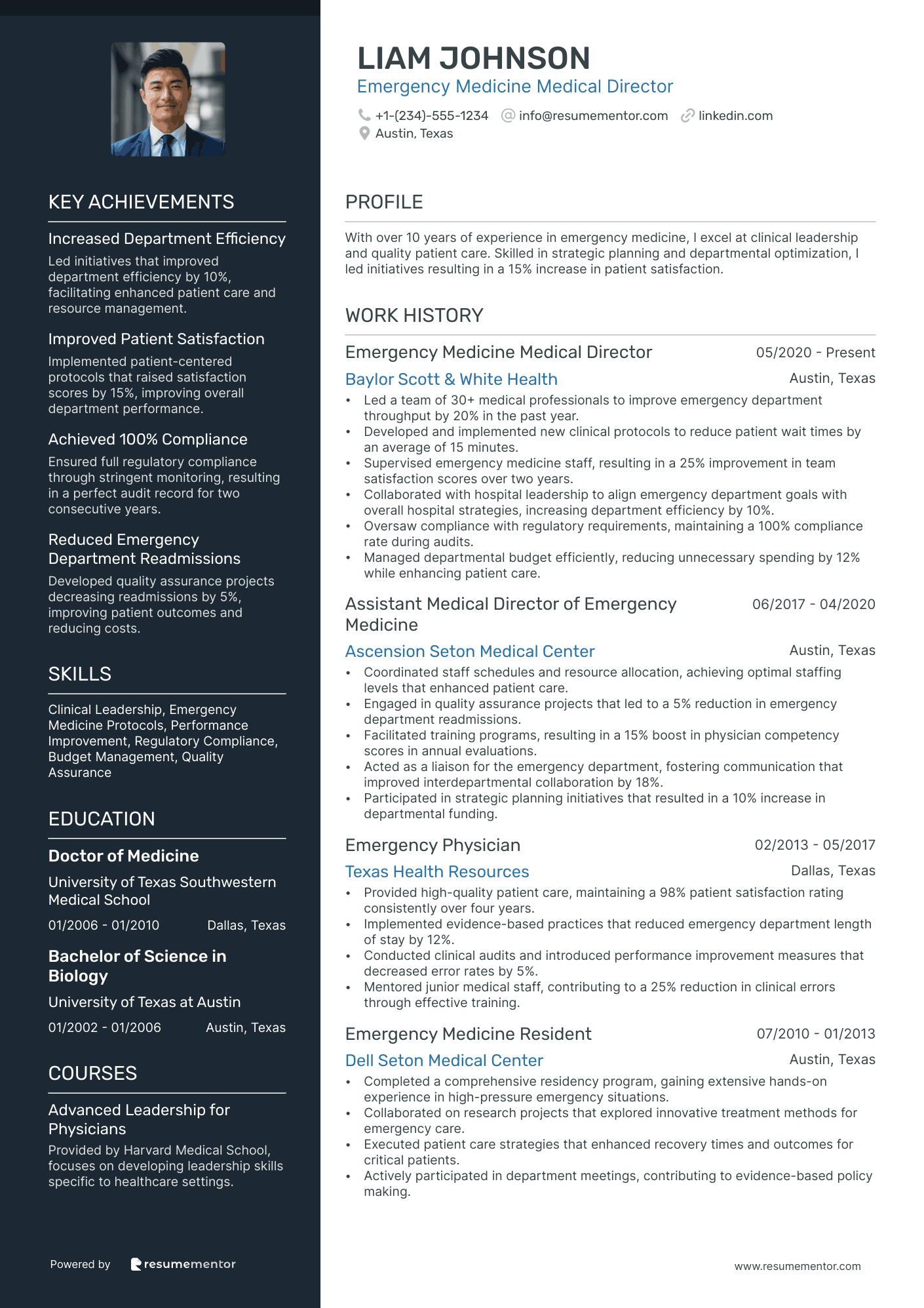
Emergency Medicine Medical Director
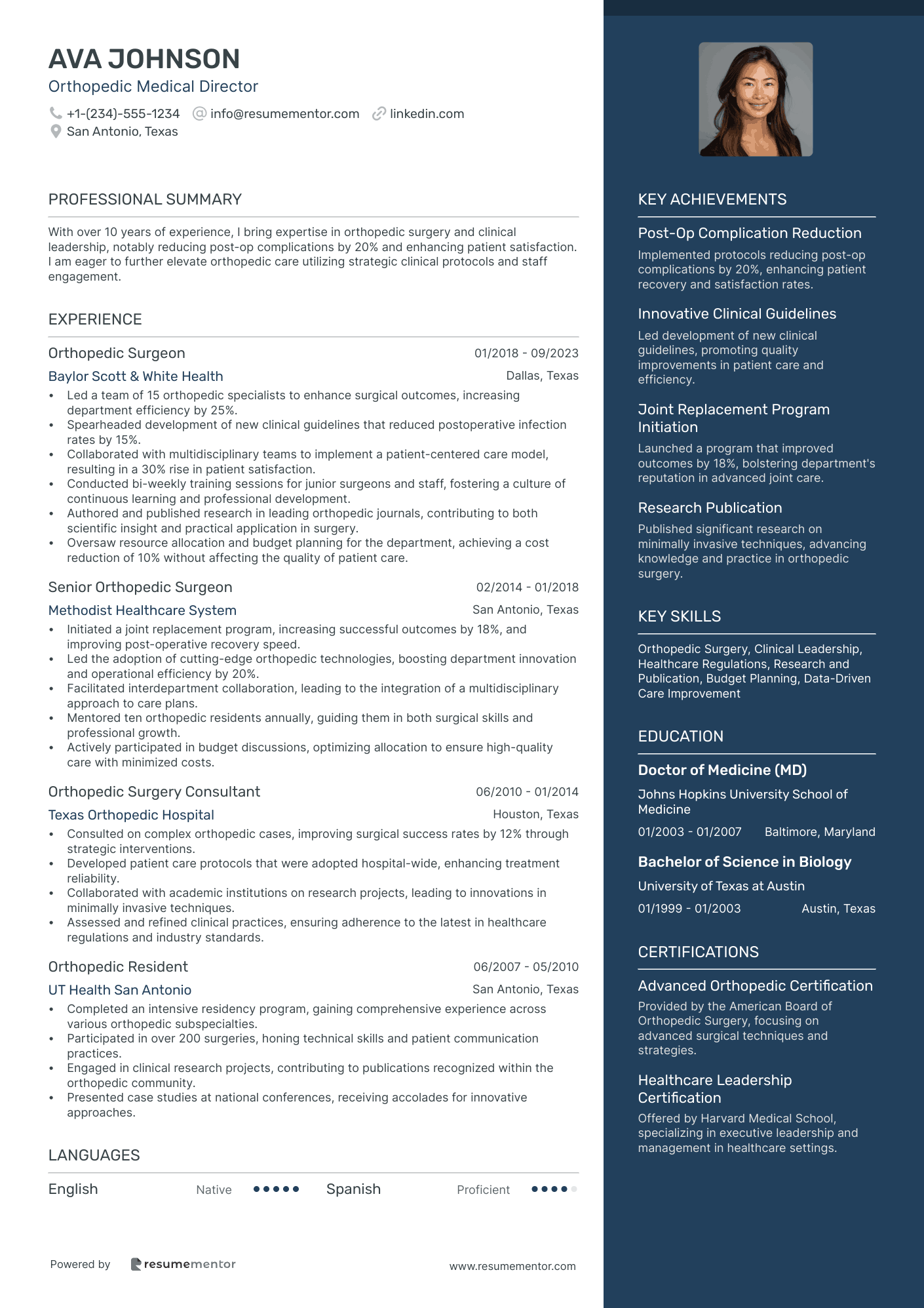
Orthopedic Medical Director
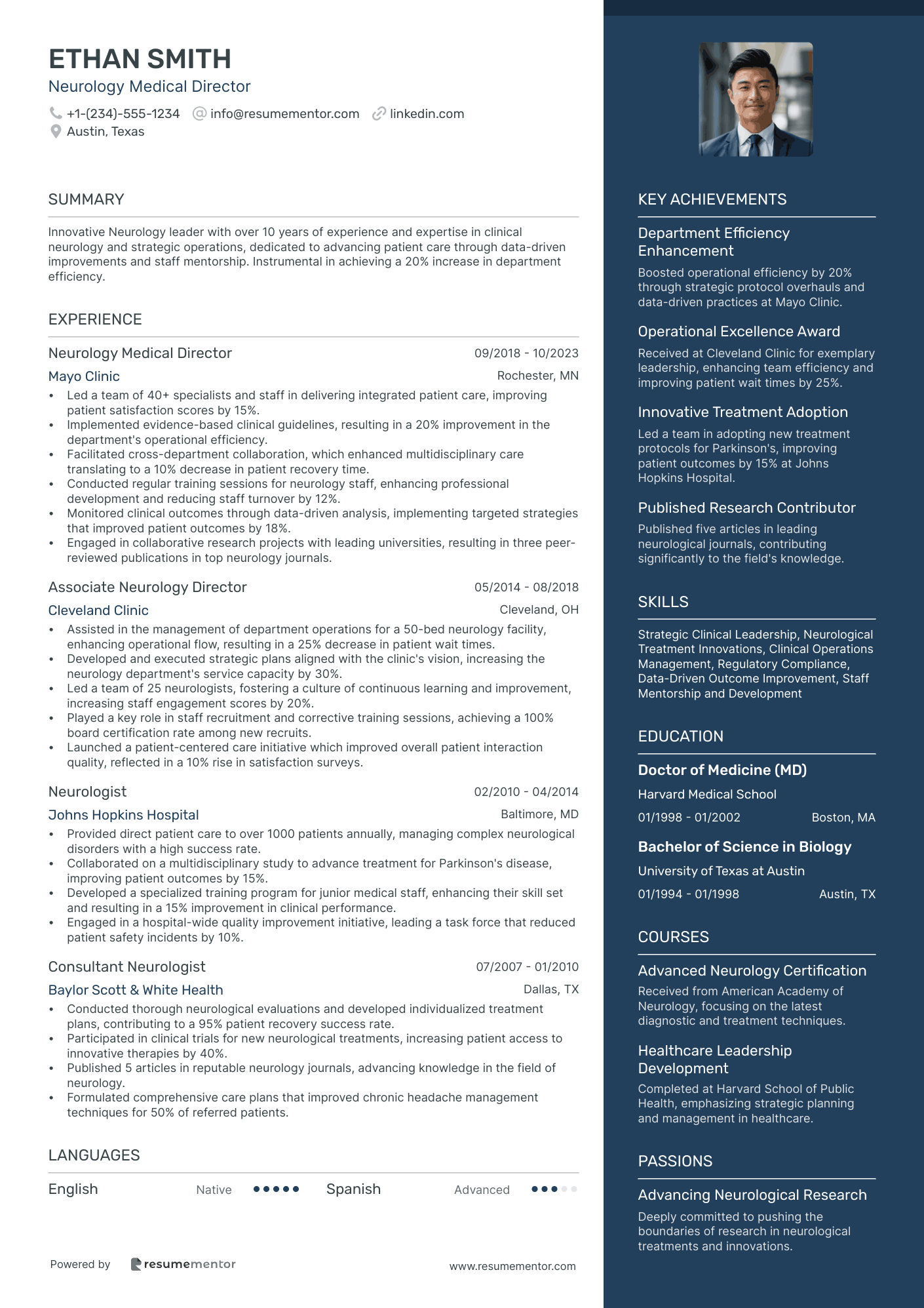
Neurology Medical Director
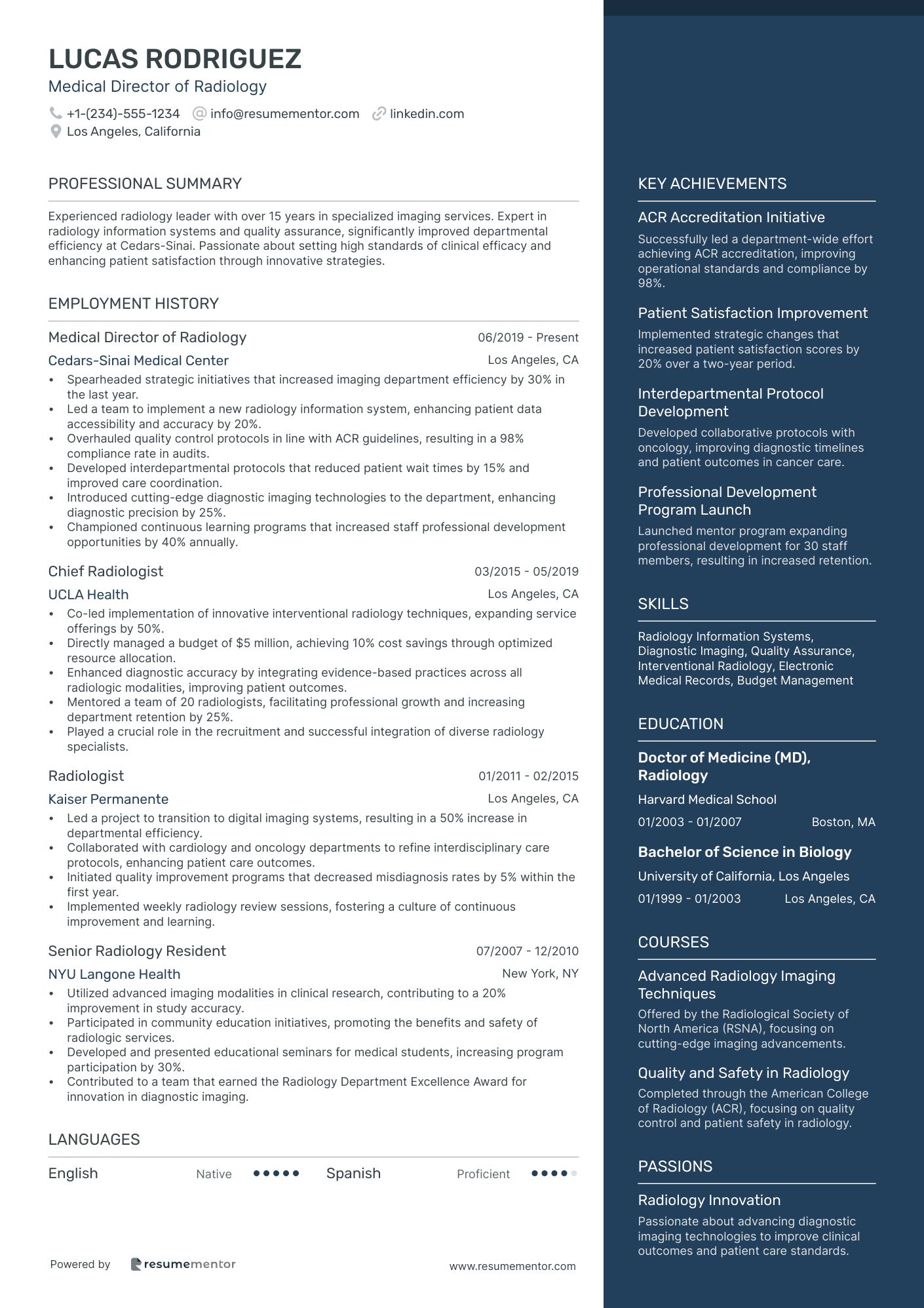
Medical Director of Radiology

Medical Director of Cardiology resume sample
- •Led the cardiology department, resulting in a 30% increase in operational efficiency and patient satisfaction scores.
- •Implemented evidence-based treatment protocols resulting in a 20% reduction in readmission rates over a 12-month period.
- •Managed a team of 20 professionals and facilitated a 25% improvement in staff performance metrics through targeted training.
- •Spearheaded the development of a community outreach cardiovascular health program that increased participant engagement by 40%.
- •Collaborated with multidisciplinary teams, enhancing patient care strategies and achieving a 15% increase in positive patient outcomes.
- •Secured $500,000 in funding for clinical research to advance cardiovascular disease understanding and treatment options.
- •Oversaw clinical operations for cardiology services, ensuring compliance and reducing error rates by 18%.
- •Developed and implemented a mentorship program that boosted junior staff retention rates by 33%.
- •Orchestrated budget management for a $2 million department, maintaining costs under budget for four consecutive years.
- •Increased departmental patient throughput by 20% by enhancing scheduling systems and resource allocation.
- •Initiated a clinical pathway project that improved treatment times and patient satisfaction by 10%.
- •Diagnosed and treated a diverse range of cardiovascular conditions, improving patient recovery rates by 15%.
- •Participated in clinical research that led to a publication on atrial fibrillation management strategies.
- •Collaborated with nursing staff to improve patient care protocols, achieving a 12% reduction in inpatient complications.
- •Engaged in community health seminars, increasing cardiovascular awareness among the adult population by 25%.
- •Provided comprehensive cardiovascular evaluations, contributing to an 18% year-over-year improvement in patient diagnostics.
- •Assisted in developing a patient-centered care model that enhanced patient satisfaction scores by 22%.
- •Partnered with a multidisciplinary team that resulted in a 15% increase in treatment efficacy for heart disease patients.
- •Led educational workshops, fostering a culture of knowledge sharing that improved staff engagement levels by 20%.
Pediatric Medical Director resume sample
- •Led strategic initiatives that increased patient satisfaction scores by 30% over 2 years, spearheading a comprehensive quality improvement program.
- •Supervised clinical operations across a multidisciplinary team of 50, improving compliance with regulatory standards by 20% in just one year.
- •Developed and implemented comprehensive care plans, increasing treatment effectiveness for chronic conditions by 25% among pediatric patients.
- •Facilitated continuing education workshops for pediatric staff, enhancing skillsets and reducing errors by 15%, thereby improving overall patient safety.
- •Championed data-driven approaches to enhance operational efficiency, resulting in a 20% improvement in resource utilization.
- •Represented the pediatric division in strategic planning forums, successfully advocating for a $2 million budget allocation for advanced pediatric care technologies.
- •Increased department efficiency by 35% through the implementation of state-of-the-art EHR systems tailored to pediatric needs.
- •Mentored a team of 40 pediatricians and nurses, enhancing interdisciplinary collaboration and leading to a 20% reduction in patient handling times.
- •Developed a strategic pediatric patient management program, leading to a 25% reduction in patient readmission rates over the span of two years.
- •Collaborated with healthcare providers to develop tailored treatment plans, resulting in a 30% improvement in chronic case management outcomes.
- •Advocated for and implemented cutting-edge pediatric care innovations, catalyzing a 40% increase in successful clinical trial participation.
- •Provided consulting on complex pediatric cases, contributing to a 50% increase in clinical decision-making accuracy within one year.
- •Led interdisciplinary meetings to design comprehensive pediatric care plans, achieving a 30% improvement in measured patient outcomes.
- •Authored clinical guidelines which standardized treatment protocols, resulting in a 20% improvement in compliance and patient safety.
- •Trained and supported new pediatric staff, enhancing department capabilities and reducing staff turnover by 10% annually.
- •Completed a rotation in a high-volume pediatric department, managing diverse patient cases and enhancing clinical skills.
- •Engaged in extensive patient care activities, contributing to a 20% improvement in patient discharge readiness during residency.
- •Participated in research projects analyzing pediatric patient care processes, influencing a 15% increase in treatment protocol efficiency.
- •Collaborated with a multidisciplinary team to streamline daily operations, leading to a 10% improvement in workflow efficiency.
Clinical Research Medical Director resume sample
- •Led medical oversight across 15 global clinical trials, significantly enhancing protocol development and ensuring 100% compliance with regulatory standards.
- •Collaborated with cross-functional teams to improve clinical study execution, leading to a 20% reduction in trial durations.
- •Reviewed and provided interpretation of complex clinical data, achieving an 85% success rate in study approvals.
- •Acted as a primary liaison with investigators, improving communication channels and response time by 40%.
- •Developed and enacted risk mitigation strategies, reducing potential trial setbacks by 25%.
- •Mentored a team of 10 junior clinical experts, enhancing their understanding of regulatory requirements and increasing team efficiency by 35%.
- •Directed clinical study protocols, resulting in an acceleration of approval timelines by 15%.
- •Ensured scientific excellence and integrity in over 20 clinical trials, resulting in industry accolades for innovation.
- •Led comprehensive data analysis, enhancing data accuracy by 25% through advanced methodological approaches.
- •Improved collaboration between scientific, regulatory, and biostatistics teams, optimizing the workflow and study outcomes.
- •Regularly sanitized communication pathways with regulatory bodies, resulting in a 50% increase in positive interactions and approvals.
- •Contributed to the design and successful execution of over 10 clinical trials, enhancing patient enrollment by 30%.
- •Played a key role in developing enhanced risk assessment protocols, reducing adverse events by 25%.
- •Supported cross-functional teams, bolstering project outcomes and surpassing expected timelines by 20%.
- •Provided strategic scientific input to marketing teams, assisting in the successful launch of two major products.
- •Managed the operational oversight of multiple clinical trials, contributing to a 15% improvement in client satisfaction scores.
- •Enhanced site monitoring procedures, leading to a 20% improvement in data reliability and consistency.
- •Actively interfaced with clinical teams and sites to streamline processes, resulting in a productivity boost of 25%.
- •Played a crucial role in advancing the adoption of new monitoring technologies, enhancing trial accuracy by 30%.
Medical Director of Oncology resume sample
- •Directed the oncology department operations, optimizing patient care resulting in a 20% improvement in patient satisfaction scores.
- •Implemented new clinical protocols and treatment pathways increasing treatment efficacy by 15% year-on-year.
- •Led the department in achieving compliance with all accreditation standards and regulatory requirements, reducing previous audit citations by 40%.
- •Mentored and guided a multidisciplinary medical team, fostering professional growth which reduced staff turnover by 25%.
- •Pioneered integrated care models, boosting patient referrals by 30% over two years.
- •Developed robust relationships with referring physicians, boosting patient continuity of care by 18%.
- •Led clinical research initiatives that resulted in 12% increase in participation in clinical trials.
- •Enhanced patient care through evidence-based practice implementation, improving treatment outcomes by 10%.
- •Orchestrated quality improvement projects reducing patient wait times by 25% in the oncology department.
- •Supervised the training and development of junior oncologists, enhancing departmental expertise and cohesion.
- •Engaged in community outreach to increase department reach, enhancing public awareness by 30%.
- •Developed treatment protocols that resulted in a 15% improvement in patient recovery rates.
- •Collaborated with cross-functional teams to integrate new technologies into oncology treatments.
- •Participated in over 25 clinical trials, contributing to significant advancements in treatment methodologies.
- •Reduced oncology service operational costs by 10% through strategic resource management.
- •Administered innovative treatment plans, achieving a 5% increase in early cancer detection rates.
- •Proactively engaged in patient education initiatives, resulting in a 20% increase in patient compliance.
- •Contributed to department-wide clinical guidelines revision, enhancing patient safety standards.
- •Delivered lectures and workshops, boosting oncologists' engagement in continuous professional development by 40%.
Hospice and Palliative Care Medical Director resume sample
- •Led a multidisciplinary team to improve patient care quality, resulting in a 15% increase in patient satisfaction over two years.
- •Implemented evidence-based care protocols that reduced hospital readmission rates by 25% within the first six months.
- •Developed comprehensive training programs for new medical staff, improving team performance by 30% within the first year.
- •Collaborated with community organizations to enhance palliative care service delivery, increasing referrals by 20% annually.
- •Oversaw compliance and regulatory requirements, achieving a 98% compliance rate during state audits.
- •Steered quality improvement initiatives, which raised clinical efficiency by 40% in the last year.
- •Managed a team of 50 healthcare professionals, enhancing patient care plans leading to a 20% growth in patient intake.
- •Coordinated advanced training sessions for staff, improving team adaptability to patient needs by 35%.
- •Conducted patient rounds and care consultations, raising patient satisfaction ratings by focusing on personalized care.
- •Aligned clinical operations with latest hospice guidelines, resulting in improved care continuity across patient touchpoints.
- •Built robust partnerships with community agencies, increasing network reach by 30% and facilitating better resource sharing.
- •Led a team of physicians and nurses to deliver excellent patient care, achieving a 95% patient satisfaction rate.
- •Pioneered care planning meetings, ensuring comprehensive approaches for managing complex patient needs resulting in improved outcomes.
- •Conducted community outreach programs, which increased hospice care awareness by 40% during my tenure.
- •Implemented EMR systems, enhancing documentation processing speed by 50% for comprehensive patient care tracking.
- •Provided empathetic care to patients with terminal illnesses, consistently receiving positive feedback from families.
- •Developed individualized care plans, enhancing care consistency across diverse patient populations.
- •Collaborated with healthcare teams to optimize patient care strategies, reducing unnecessary hospitalizations by 20%.
- •Mentored junior medical staff in hospice care best practices, contributing to a 15% increase in team competency levels.
Psychiatric Medical Director resume sample
- •Directed a multidisciplinary team, fostering collaboration which led to a 30% increase in patient satisfaction scores.
- •Developed and implemented new psychiatric protocols that reduced patient wait times by 20%.
- •Initiated community outreach programs that increased local mental health awareness by 35%.
- •Conducted over 500 patient evaluations annually, refining diagnostic accuracy and treatment effectiveness.
- •Mentored junior staff, resulting in a 40% improvement in yearly staff retention rates.
- •Spearheaded integration of a new EHR system, improving record accuracy and accessibility by 50%.
- •Led a team of 10 psychiatrists in delivering high-quality patient care, resulting in a 15% decrease in readmission rates.
- •Created performance evaluation metrics that enhanced clinical staff development by 25%.
- •Collaborated with healthcare leaders to integrate mental health services throughout the organization.
- •Implemented training programs that improved clinical assessments and patient interaction.
- •Enhanced multidisciplinary team communications, leading to a 20% improvement in treatment outcomes.
- •Conducted comprehensive psychiatric assessments, contributing to improved patient recovery rates by 10%.
- •Overseen policy development that ensured compliance with state and federal mental health regulations.
- •Participated in quality improvement initiatives that enhanced service delivery and patient outcomes.
- •Facilitated regular staff training sessions on new psychiatric treatment methodologies.
- •Provided direct patient care, implementing individualized treatment plans that achieved a 20% improvement in patient stability.
- •Collaborated with primary care physicians to integrate psychiatric treatment into overall patient care plans.
- •Utilized electronic health records to enhance patient case management and treatment tracking.
- •Engaged in continuous education to ensure application of the latest evidence-based practices in psychiatry.
Emergency Medicine Medical Director resume sample
- •Led a team of 30+ medical professionals to improve emergency department throughput by 20% in the past year.
- •Developed and implemented new clinical protocols to reduce patient wait times by an average of 15 minutes.
- •Supervised emergency medicine staff, resulting in a 25% improvement in team satisfaction scores over two years.
- •Collaborated with hospital leadership to align emergency department goals with overall hospital strategies, increasing department efficiency by 10%.
- •Oversaw compliance with regulatory requirements, maintaining a 100% compliance rate during audits.
- •Managed departmental budget efficiently, reducing unnecessary spending by 12% while enhancing patient care.
- •Coordinated staff schedules and resource allocation, achieving optimal staffing levels that enhanced patient care.
- •Engaged in quality assurance projects that led to a 5% reduction in emergency department readmissions.
- •Facilitated training programs, resulting in a 15% boost in physician competency scores in annual evaluations.
- •Acted as a liaison for the emergency department, fostering communication that improved interdepartmental collaboration by 18%.
- •Participated in strategic planning initiatives that resulted in a 10% increase in departmental funding.
- •Provided high-quality patient care, maintaining a 98% patient satisfaction rating consistently over four years.
- •Implemented evidence-based practices that reduced emergency department length of stay by 12%.
- •Conducted clinical audits and introduced performance improvement measures that decreased error rates by 5%.
- •Mentored junior medical staff, contributing to a 25% reduction in clinical errors through effective training.
- •Completed a comprehensive residency program, gaining extensive hands-on experience in high-pressure emergency situations.
- •Collaborated on research projects that explored innovative treatment methods for emergency care.
- •Executed patient care strategies that enhanced recovery times and outcomes for critical patients.
- •Actively participated in department meetings, contributing to evidence-based policy making.
Orthopedic Medical Director resume sample
- •Led a team of 15 orthopedic specialists to enhance surgical outcomes, increasing department efficiency by 25%.
- •Spearheaded development of new clinical guidelines that reduced postoperative infection rates by 15%.
- •Collaborated with multidisciplinary teams to implement a patient-centered care model, resulting in a 30% rise in patient satisfaction.
- •Conducted bi-weekly training sessions for junior surgeons and staff, fostering a culture of continuous learning and professional development.
- •Authored and published research in leading orthopedic journals, contributing to both scientific insight and practical application in surgery.
- •Oversaw resource allocation and budget planning for the department, achieving a cost reduction of 10% without affecting the quality of patient care.
- •Initiated a joint replacement program, increasing successful outcomes by 18%, and improving post-operative recovery speed.
- •Led the adoption of cutting-edge orthopedic technologies, boosting department innovation and operational efficiency by 20%.
- •Facilitated interdepartment collaboration, leading to the integration of a multidisciplinary approach to care plans.
- •Mentored ten orthopedic residents annually, guiding them in both surgical skills and professional growth.
- •Actively participated in budget discussions, optimizing allocation to ensure high-quality care with minimized costs.
- •Consulted on complex orthopedic cases, improving surgical success rates by 12% through strategic interventions.
- •Developed patient care protocols that were adopted hospital-wide, enhancing treatment reliability.
- •Collaborated with academic institutions on research projects, leading to innovations in minimally invasive techniques.
- •Assessed and refined clinical practices, ensuring adherence to the latest in healthcare regulations and industry standards.
- •Completed an intensive residency program, gaining comprehensive experience across various orthopedic subspecialties.
- •Participated in over 200 surgeries, honing technical skills and patient communication practices.
- •Engaged in clinical research projects, contributing to publications recognized within the orthopedic community.
- •Presented case studies at national conferences, receiving accolades for innovative approaches.
Neurology Medical Director resume sample
- •Led a team of 40+ specialists and staff in delivering integrated patient care, improving patient satisfaction scores by 15%.
- •Implemented evidence-based clinical guidelines, resulting in a 20% improvement in the department's operational efficiency.
- •Facilitated cross-department collaboration, which enhanced multidisciplinary care translating to a 10% decrease in patient recovery time.
- •Conducted regular training sessions for neurology staff, enhancing professional development and reducing staff turnover by 12%.
- •Monitored clinical outcomes through data-driven analysis, implementing targeted strategies that improved patient outcomes by 18%.
- •Engaged in collaborative research projects with leading universities, resulting in three peer-reviewed publications in top neurology journals.
- •Assisted in the management of department operations for a 50-bed neurology facility, enhancing operational flow, resulting in a 25% decrease in patient wait times.
- •Developed and executed strategic plans aligned with the clinic's vision, increasing the neurology department's service capacity by 30%.
- •Led a team of 25 neurologists, fostering a culture of continuous learning and improvement, increasing staff engagement scores by 20%.
- •Played a key role in staff recruitment and corrective training sessions, achieving a 100% board certification rate among new recruits.
- •Launched a patient-centered care initiative which improved overall patient interaction quality, reflected in a 10% rise in satisfaction surveys.
- •Provided direct patient care to over 1000 patients annually, managing complex neurological disorders with a high success rate.
- •Collaborated on a multidisciplinary study to advance treatment for Parkinson's disease, improving patient outcomes by 15%.
- •Developed a specialized training program for junior medical staff, enhancing their skill set and resulting in a 15% improvement in clinical performance.
- •Engaged in a hospital-wide quality improvement initiative, leading a task force that reduced patient safety incidents by 10%.
- •Conducted thorough neurological evaluations and developed individualized treatment plans, contributing to a 95% patient recovery success rate.
- •Participated in clinical trials for new neurological treatments, increasing patient access to innovative therapies by 40%.
- •Published 5 articles in reputable neurology journals, advancing knowledge in the field of neurology.
- •Formulated comprehensive care plans that improved chronic headache management techniques for 50% of referred patients.
Medical Director of Radiology resume sample
- •Spearheaded strategic initiatives that increased imaging department efficiency by 30% in the last year.
- •Led a team to implement a new radiology information system, enhancing patient data accessibility and accuracy by 20%.
- •Overhauled quality control protocols in line with ACR guidelines, resulting in a 98% compliance rate in audits.
- •Developed interdepartmental protocols that reduced patient wait times by 15% and improved care coordination.
- •Introduced cutting-edge diagnostic imaging technologies to the department, enhancing diagnostic precision by 25%.
- •Championed continuous learning programs that increased staff professional development opportunities by 40% annually.
- •Co-led implementation of innovative interventional radiology techniques, expanding service offerings by 50%.
- •Directly managed a budget of $5 million, achieving 10% cost savings through optimized resource allocation.
- •Enhanced diagnostic accuracy by integrating evidence-based practices across all radiologic modalities, improving patient outcomes.
- •Mentored a team of 20 radiologists, facilitating professional growth and increasing department retention by 25%.
- •Played a crucial role in the recruitment and successful integration of diverse radiology specialists.
- •Led a project to transition to digital imaging systems, resulting in a 50% increase in departmental efficiency.
- •Collaborated with cardiology and oncology departments to refine interdisciplinary care protocols, enhancing patient care outcomes.
- •Initiated quality improvement programs that decreased misdiagnosis rates by 5% within the first year.
- •Implemented weekly radiology review sessions, fostering a culture of continuous improvement and learning.
- •Utilized advanced imaging modalities in clinical research, contributing to a 20% improvement in study accuracy.
- •Participated in community education initiatives, promoting the benefits and safety of radiologic services.
- •Developed and presented educational seminars for medical students, increasing program participation by 30%.
- •Contributed to a team that earned the Radiology Department Excellence Award for innovation in diagnostic imaging.
Navigating healthcare leadership is like steering a complex ship through turbulent waters, and your resume is the compass guiding your career journey. As a medical director, you need more than just a list of previous roles; it's about capturing your career success and potential. In a field where clinical acumen and leadership skills directly impact patient outcomes and organizational achievements, crafting a standout resume is essential.
Balancing your medical expertise with strategic leadership can be challenging. Many medical directors find it tough to highlight their clinical accomplishments while also showcasing their managerial skills. A well-structured resume is your chance to bring both elements together, demonstrating your ability to lead while maintaining excellent patient care.
A resume template can seamlessly guide you through this process, offering a clear framework to present your story. It allows you to focus on what matters—your content—without worrying about formatting issues. If you’re ready to elevate your resume, these templates can help you organize your experiences effectively.
When done right, a resume speaks directly to hiring managers, showing your passion and competence at a glance. It transforms simple paper into a powerful personal marketing tool. With the right approach, your resume can elevate your career narrative, steering your professional journey toward success.
Key Takeaways
- Crafting a medical director resume requires balancing medical expertise with strategic leadership skills, using a clear and structured format to present both your career success and potential.
- Utilize a reverse-chronological format to highlight your most recent roles and accomplishments and consider modern fonts to ensure professionalism.
- Incorporate measurable achievements and integrate keywords from job ads to set yourself apart in the resume experience section.
- Incorporate both hard skills like healthcare regulations and soft skills such as leadership and communication to catch the attention of employers.
- Consider additional sections like language skills, hobbies, volunteer work, and books to provide a fuller picture of your multifaceted capabilities as a medical director.
What to focus on when writing your medical director resume
A medical director resume should clearly convey leadership in the medical field, showcasing your ability to manage healthcare teams effectively. Your resume should highlight how you enhance healthcare delivery while ensuring compliance with essential medical regulations. Through strategic planning and a strong dedication to patient care, your experience should stand out.
How to structure your medical director resume
- Contact Information: Start with your full name, phone number, email address, and LinkedIn profile—placing this section at the top ensures quick access for recruiters who are evaluating multiple candidates. Clear and accurate contact details are a crucial first step in making a great impression.
- Professional Summary: Offer a concise overview of your extensive experience, focusing on your expertise in patient care improvement and leadership roles within healthcare settings—this section gives recruiters a snapshot of your career achievements and the value you can bring to a medical organization immediately.
- Medical Expertise: Highlight your areas of specialization, certifications, and training, demonstrating how you impact patient outcomes and uphold healthcare standards—this helps emphasize your qualifications and illustrates your in-depth knowledge and skills relevant to the field of medicine.
- Leadership Experience: Share your success in guiding and supervising medical teams, emphasizing achievements in policy development and system improvements—these examples showcase your ability to lead and adapt, ensuring effective healthcare management and delivery.
- Education: Clearly list your medical degrees and institutions, along with certifications that enhance your qualifications as a leader in the medical field—this section demonstrates your foundational knowledge and continuous professional development essential for a medical director role.
- Regulatory Knowledge: Highlight your understanding of healthcare regulations, such as HIPAA and JCAHO, to demonstrate your commitment to maintaining industry standards—showcasing this knowledge reassures recruiters of your ability to navigate complex regulatory environments successfully.
With an understanding of these essential sections, below we'll cover each in more depth through a focused resume format breakdown.
Which resume format to choose
A reverse-chronological format is ideal when writing a medical director resume. This format places your most recent roles and accomplishments at the top, which is essential for showcasing the progression and depth of your experience. In the medical field, where your latest positions and achievements often carry the most weight, this format ensures that hiring managers can quickly grasp your qualifications.
Choosing the right font is another important aspect of crafting an impressive resume. Opt for modern fonts like Lato, Montserrat, or Raleway. These fonts offer a sleek and updated look that keeps your resume from feeling outdated. While the font choice might seem minor, it contributes to the overall readability and professionalism of your document.
When it comes to sharing your resume, always save it as a PDF. This file type maintains the integrity of your layout and design, which is crucial when you want every detail to appear precisely as intended. Unlike other formats, PDFs ensure consistency no matter what device or software is used to open your resume.
Don't underestimate the power of margins in creating a polished resume. One-inch margins on all sides offer a balanced aesthetic, making your content easy on the eyes. Adequate white space prevents your resume from feeling cramped, allowing the reader to focus on your valuable content. Together, these elements create a resume that effectively communicates your skills and experiences, positioning you as a standout candidate in the competitive medical field.
How to write a quantifiable resume experience section
Crafting an outstanding experience section in your medical director resume requires clarity, relevance, and impact. By focusing on measurable achievements, you set yourself apart, showcasing your growth and leadership in the field. Start by listing your most recent roles first, working backward to draw attention to your current expertise. This reverse order not only emphasizes your career progression but also highlights your most significant contributions. When tailoring your resume, be sure to integrate keywords from the job ad that align with your experience. Include roles from the past 10-15 years if they remain relevant, concentrating specifically on experiences that strengthen your suitability for a medical director position. Action words like "spearheaded," "optimized," and "achieved" bring your strong initiative and results-driven nature to life.
- •Increased departmental efficiency by 30% through the implementation of innovative technologies and streamlined procedures.
- •Reduced patient readmission rates by 15% by developing and integrating a comprehensive patient follow-up program.
- •Led a team of 40 medical professionals, achieving a 20% improvement in patient satisfaction scores over three years.
- •Secured $2 million in funding for new research initiatives, expanding the center's research capabilities.
This experience section stands out by seamlessly aligning with what a medical director role entails. Each bullet point not only highlights your accomplishments but also connects to the broader skills and leadership qualities essential in healthcare. The structure adeptly underscores your main achievements while maintaining a focus on relevant details, creating a flowing narrative of your impact. Using action-oriented language brings the section to life, clearly showing how you can drive positive changes and underscoring your value to potential employers.
Growth-Focused resume experience section
A growth-focused medical director resume experience section should clearly convey how you have driven advances in patient care and clinic operations. Begin by highlighting specific accomplishments, such as improving patient satisfaction through targeted care enhancements or introducing new medical procedures that led to better outcomes. Detail your role in expanding services or optimizing processes, focusing on the measurable benefits achieved.
Strong leadership and professional development of your team are crucial, so emphasize any mentoring programs or staff training initiatives you led. Explain how these efforts contributed to team growth and improved performance. Use straightforward language and concentrate on how your actions positively impacted the organization.
Medical Director
Green Valley Health Clinic
January 2018 - Present
- Increased patient satisfaction by 20% through patient-centered care improvements.
- Expanded clinic operations with new specialty services, boosting revenue by 30%.
- Created a staff training program that enhanced skills and productivity.
- Successfully led accreditation process, meeting all standards on the first attempt.
Innovation-Focused resume experience section
An innovation-focused medical director resume experience section should effectively highlight your talent for leading and inspiring change within the medical field. Begin by outlining specific achievements that showcase your role in advancing medical initiatives, using active, straightforward language to illustrate your innovative strategies. Demonstrating your impact with numbers can add clarity and emphasize the significance of your achievements. Structured information, such as employment dates, job title, workplace, and detailed bullet points, paints a full picture of your contributions.
Each bullet point should seamlessly capture diverse aspects of your role, weaving leadership, innovation, and results-driven strategies together. This approach not only helps employers see your professional journey clearly but also aligns with what they seek in forward-thinking candidates eager to advance healthcare.
Medical Director
Healthcare Innovations Inc.
June 2018 - Present
- Led a team of 15 in developing a new telemedicine platform, boosting patient reach by 30%.
- Introduced data-driven processes that cut patient care costs by 25%.
- Promoted interdisciplinary teamwork, speeding up innovation cycles by 20%.
- Started a chronic disease management program that improved patient outcomes by 15% over a year.
Industry-Specific Focus resume experience section
A medical director-focused resume experience section should highlight your leadership skills and medical expertise, while clearly demonstrating your contributions to healthcare improvement. Begin by stating your role and the institution's name, then use bullet points with action verbs and quantifiable outcomes to illustrate the impact of your work. It's important to emphasize any initiatives you led, improvements you made, or innovative practices you introduced, as these elements showcase your ability to enhance patient care and streamline processes.
Your experience in managing teams, overseeing clinical operations, and driving strategic growth should be detailed alongside your collaborations with cross-functional teams and partnerships with other medical facilities. Involvement in community outreach can also underscore your commitment to broadening health access. Keep each bullet concise and straightforward, ensuring your achievements are communicated clearly without excessive jargon. This approach creates a comprehensive picture of your value as a medical director that effectively captures attention and highlights your contributions.
Medical Director
Sunrise Health Institute
January 2015 - Present
- Directed a multi-disciplinary team to reduce readmission rates by 15% over two years.
- Implemented a digital health initiative that improved patient engagement across the system.
- Established a mentorship program for new clinicians, enhancing their integration and performance.
- Collaborated with external partners to expand community health access and outreach.
Technology-Focused resume experience section
A technology-focused medical director resume experience section should encapsulate how your expertise transforms healthcare through innovative technologies. Begin by detailing your most recent role and emphasize projects where you've driven tech integration within health services. Highlight accomplishments with specific examples, illustrating what you did, the methods you used, and the positive results achieved. Action-oriented language and quantified successes help create a clear and compelling picture of your impact.
As you describe your experience, connect the dots between technology and patient care improvements by noting your role in leading projects that enhance health service delivery. Discuss how collaborations with IT teams led to increased security or reduced costs, showcasing your leadership in steering tech-driven initiatives. Highlight your ability to stay current with industry trends and adapt swiftly, underscoring your role as an innovative leader in the evolving healthcare landscape.
Medical Director
City Health Hospital
June 2018 - Present
- Led a team to implement a new electronic medical records system, cutting patient processing time by 30%.
- Promoted telemedicine technologies, extending patient access by 45%.
- Worked with IT to ensure data security, reducing breaches by 15%.
- Developed a tech tool training program for staff, driving a 25% boost in efficiency.
Write your medical director resume summary section
A role-focused medical director resume summary should highlight your unique experience, skills, and achievements in a way that captures attention. This section is crucial because it sets the tone for your entire resume, demonstrating what makes you stand out. Instead of outlining future career goals like a resume objective might, a well-crafted summary emphasizes your proven skills and past successes.
Here's an example of a medical director resume summary:
This summary effectively encapsulates your career by highlighting specific achievements and skills. It begins by establishing your expertise, then demonstrates your impact with measurable results. This approach not only establishes credibility but also engages potential employers. Understanding the difference between a summary and similar sections like an objective or profile is also key. A summary of qualifications focuses on listing skills and achievements with hard facts, while a resume profile often combines elements of both a summary and an objective. Deciding whether to use a summary or an objective can tailor your resume to your career stage and the job you're targeting. With clarity and focus, whether you're a seasoned medical director or aspiring to be one, your professional story can be powerfully communicated.
Listing your medical director skills on your resume
A skills-focused medical director resume effectively highlights your qualifications at a glance. Start by considering whether you want to create a standalone skills section or incorporate your skills into parts like the experience or summary sections. Highlighting both hard and soft skills is essential. Your strengths and soft skills show how you handle situations and interact with people, highlighting qualities such as leadership and communication abilities. On the other hand, hard skills are concrete abilities or knowledge required for the job, like understanding healthcare regulations. Together, skills and strengths serve as keywords on your resume, helping you catch the attention of employers and navigate applicant tracking systems effectively.
Here’s an example of a skills section for a medical director resume:
This skills section stands out because it's clear and aligned with what a medical director needs to succeed. Each skill is crucial, bridging the gap from understanding healthcare regulations to effectively leading a team. This alignment ensures that your skills work as keywords, improving visibility in job searches and demonstrating to employers that you're the right fit.
Best hard skills to feature on your medical director resume
For a medical director, hard skills emphasize your technical expertise and demonstrate what’s necessary to succeed in leading a healthcare organization smoothly.
Hard Skills
- Healthcare Regulations
- Clinical Expertise
- Financial Management
- Risk Management
- Data Analysis
- Compliance
- Strategic Planning
- Electronic Health Records (EHR) Proficiency
- Quality Improvement
- Budgeting
- Crisis Management
- Performance Metrics
- Research Methodology
- Public Health Knowledge
- Technical Writing
Best soft skills to feature on your medical director resume
Soft skills showcase your personal traits, reflecting how you interact with others and underscoring your capabilities in leadership, communication, and management.
Soft Skills
- Leadership
- Communication
- Decision Making
- Problem Solving
- Teamwork
- Conflict Resolution
- Adaptability
- Empathy
- Mentoring and Training
- Time Management
- Negotiation
- Emotional Intelligence
- Compassion
- Motivational Skills
- Patience
How to include your education on your resume
The education section of your resume is crucial when applying for a medical director position. It highlights your academic achievements and signals to employers that you possess the foundational knowledge required for this high-level role. Tailoring the education section to match the job you are applying for is important; therefore, only include education that is directly relevant to a medical director's responsibilities. Irrelevant educational details should remain off your resume. If you graduated with honors such as cum laude, include that information alongside your degree, as it reflects your academic excellence. When listing your degree, clearly state the type of degree, followed by the institution's name and location. Including your GPA can also be beneficial, especially if it's impressive, but it is generally more relevant if you graduated recently. Make sure to format your education entries in a clean, easy-to-read manner.
Here’s an example of how an education section might be incorrectly listed:
And here's how you might correctly format the education section for a medical director resume:
This second example is strong because it directly aligns with the requirements for a medical director position. The degree is relevant, and the GPA of 3.9 indicates outstanding academic performance. The listing is clear and concise, focusing on vital information without unnecessary details. This makes it easy for potential employers to quickly verify your qualifications and academic achievements.
How to include medical director certificates on your resume
Including a certificates section on your medical director resume is essential. Certificates demonstrate your commitment to continuous education and professional development. You can also highlight essential certificates in the header of your resume for immediate visibility.
First, list the name of the certificate. Include the date you received the certificate. Add the issuing organization to provide credibility. Finally, ensure your most relevant certificates are prominently displayed.
This example is effective because it showcases certificates directly related to the role of a medical director. Each item includes the title, issuer, and displays the issuer, making the qualifications clear and credible. Including certifications such as "Board Certification in Family Medicine" and "Medical Management and Leadership" illustrates a strong foundation in both medical practice and administrative skills. This balance highlights your readiness for leadership in a medical setting.
Extra sections to include in your medical director resume
In today’s multifaceted medical landscape, a medical director must possess more than just clinical expertise. They need diverse skills and experiences that go beyond traditional healthcare training. To make your medical director resume stand out, consider including sections that highlight your language skills, hobbies and interests, volunteer work, and books you've read or written.
- Language section — Demonstrate your fluency in multiple languages to show your ability to communicate with a diverse patient population and collaborate internationally.
- Hobbies and interests section — Reveal your passions and personal pursuits to offer a glimpse into your personality and potential fit within a healthcare team's culture.
- Volunteer work section — Highlight your commitment to community service or humanitarian efforts, reflecting your dedication to the betterment of public health.
- Books section — List books you've authored or contributed to, underscoring your expertise and thought leadership in the medical field.
These sections can provide a fuller picture of you as a well-rounded candidate, making your resume not just a summary of qualifications but a narrative of your unique journey in the medical world. Adding these elements will help you connect with potential employers on a deeper level, going beyond mere professional achievements.
In Conclusion
In conclusion, crafting a standout medical director resume requires striking the right balance between showcasing your clinical expertise and highlighting your leadership skills. Your resume serves as a powerful personal marketing tool, guiding prospective employers through your career journey with clarity and impact. A well-structured resume not only addresses the essential sections like contact information, professional summary, and work experience but also gives equal attention to showcasing your soft skills, technical proficiencies, and relevant certifications.
The use of a reverse-chronological format complements your career progression, ensuring your latest accomplishments are front and center. Emphasizing actionable results and quantifiable achievements further sets you apart, demonstrating your ability to lead, innovate, and enhance patient care. Meanwhile, a strong education section underlines your foundational knowledge, while certifications underscore your commitment to continuous learning.
Including extra sections like language skills, volunteer work, and personal interests provides a holistic view of you as a candidate. These elements not only help you connect with employers on a deeper level but also demonstrate the unique qualities you bring to the table. By thoughtfully curating each component of your resume, you effectively narrate your story, positioning yourself as a compelling candidate in the multifaceted world of medical leadership. This approach not only increases your chances of landing an interview but also sets the foundation for a successful, fulfilling career as a medical director.
Related Articles

Continue Reading
Check more recommended readings to get the job of your dreams.
Resume
Resources
Tools
© 2026. All rights reserved.
Made with love by people who care.

